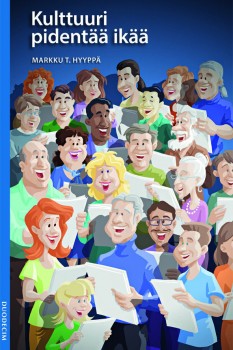Consume culture, live longer!
16 May 2013 | This 'n' that
 A culture freak (and you don’t have to be a vulture) will live longer than a couch potato.
A culture freak (and you don’t have to be a vulture) will live longer than a couch potato.
This sounds pretty obvious, doesn’t it? Watching TV is a passive pursuit, attending choir rehearsals or line dancing class isn’t – and human beings are designed to be active.
But it is also a scientific fact. Neurologist and writer MD Markku T. Hyyppä has been researching the effects of cultural pursuits on health for decades. In his new book Kulttuuri pidentää ikää (‘Culture prolongs your life’) he sets out to prove the power of culture using scientific evidence from many countries.
Cultural capital is a concept that defines the ‘usefulness of culture’. Hyyppä disagrees with the famous sociologist Pierre Bourdieu who defines cultural capital as a means for the upper classes to increase their personal status and power. According to Hyyppä, cultural capital is immaterial, originates from cultural pursuits and the consumption of culture, and brings benefits to all who take part.
Learning the basics of culture in one’s education is vital: Finland has done well in the international PISA exams, but it’s not just because the children are bright. Learning how to educate is important: unlike in many other countries, the arts play a significant role in teacher training in Finland. And arts subjects are important in education: art has a positive effect on emotions and cognition, on emotional life as well as reason. Study arts subjects, and it will be easier to learn maths!
It’s a fact is that those who are socially active in clubs, associations and cultural pursuits in general, live longer than those who are not. Economic status is not a decisive factor here. The efficacy of cultural pursuits and cultural capital on prolonging an individual’s life appears to be based on networking. i.e. social capital. Social capital increases the chances of staying alive – almost as much as non-smoking and much more than the estimated extra time of exercise or losing weight. An individual’s cultural pursuits allow him at least a couple of years more in old age.
Hyyppä also examines and comments on the cultural policies of Finnish political parties. After the Perussuomalaiset – True Finns – party presented its manifesto in 2011, stating that contemporary art should not receive any public funding, as only art that ‘strengthens the national identity’ should be funded, other political parties began hastily to revise and update their dusty arts programmes. As it has been proved in international and Finnish medical research that culture definitely has a positive impact on developing society as a whole, political parties cannot afford to ignore dealing with the subject.
In conclusion, Hyyppä states that Finland would certainly benefit from the cultural added value that manifests itself in well-being, health and a longer life spans. When people live longer healthy, the national economy gains massively.
It’s not just opera, ballet and favouring the paintings of the Düsseldorf school that bring you cultural capital and prolong your existence; rock concerts or pottery classes are fine, too. But, notes Hyyppä, being active in politics in your free time, going to church and participating in spectator sports don’t seem to have a similar positive effect, so might it be better not to concentrate on those alone?
Markku T. Hyyppä
Kulttuuri pidentää ikää
(‘Culture prolongs your life’)
Helsinki: Duodecim, 2013. 132 p.
ISBN 978-951-656-479-4
Tags: cultural politics, health, society
No comments for this entry yet
